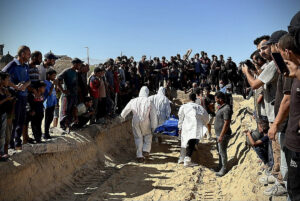After a year of terror in Gaza, our souls feel suspended in time

The bodies of 88 unidentified Palestinians are buried in a mass grave in Khan Younis, after Israeli forces returned them to Gaza severely decomposed and without any identification, 26 September 2024
Ruwaida Kamal Amer writes in +972 on 5 October 2024:
It is a terrible thing to witness the obliteration of your homeland. When I think about what we’ve lived through this past year, I feel like I’m going to lose my mind completely. It is a shock that I’m still unable to absorb. I try not to think at all, in the hope of maintaining my sanity until it ends.
Seconds go by like hours. One night of this torment is difficult enough; our souls feel suspended in time, until morning comes and we have to endure another day. We search for one piece of news that might change our lives for the better. I long for the day when we no longer hear the constant noise of bombs, warplanes, and drones. The day the death stops.
At the beginning, I was hopeful that the war would end within a week or two, like in the past. It won’t last more than a month, I would assure people; if we can just make it until then, we’ll be okay. I don’t know why I was so certain. Perhaps I believed that the world would step in to stop this madness. Twelve months later, we feel as though the world has simply accepted our suffering as if it is the natural state of affairs.
In an instant, my life was filled with terror. The school at which I used to teach has been destroyed. Several of my students and colleagues have been killed, martyred before I even had the chance to say goodbye. One colleague’s heart simply gave out, unable to bear all of this. I lost contact with many of my friends.
No longer able to do the job I love, I began channeling all of my remaining energy into writing, trying to give voice to the experience of Gazans under Israel’s brutal onslaught. But I am not an outsider: I face all of the same challenges that I report on — from forced displacement to a lack of food, water, and electricity, and the absence of healthcare.
For the first eight months of the war, until we managed to buy a solar panel, my father would walk from our home in the Al-Fukhari neighborhood, between Khan Younis and Rafah, to the European Hospital in order to charge our phones, batteries, and other devices. The lack of food and water has remained a difficult and expensive problem: I never expected to have to pay $70 for a week’s supply of water, or to carry heavy containers with my family just to fill our tanks.
For my mother, who suffers from a bone and nerve disease, this year was spent in constant pain. She cannot move without her medications, which we search for in every hospital and pharmacy.
